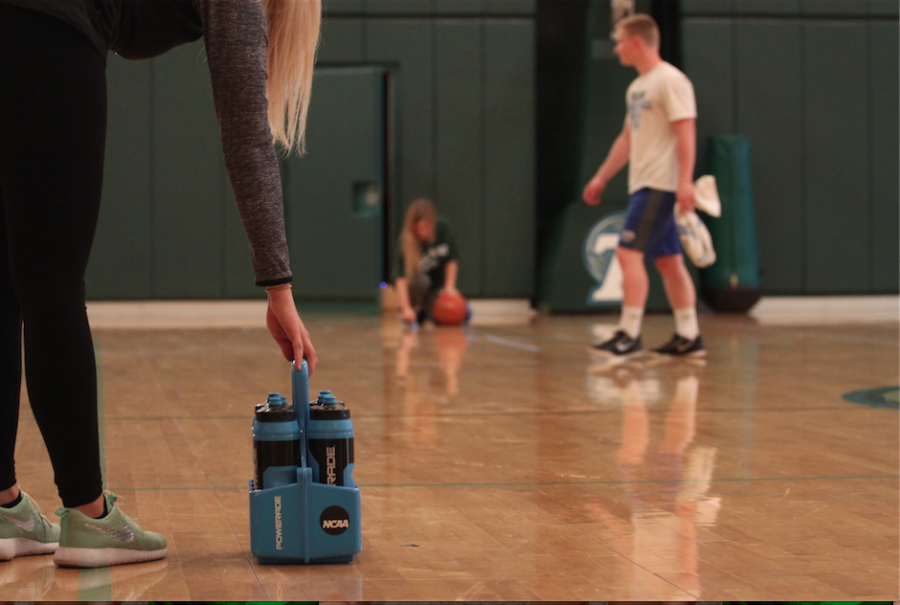The silent members of the team
Alyssa Bialek l Associate Photo Editor
Basketball managers Tyler Gibney, Allison Henderson and Stephanie Truautmann set up a basketball practice at the Hertz Center.
April 6, 2016
With a coaching staff whose sole goal is to generate a win, very few people understand the value of the individuals behind the scenes who contribute just as greatly to a team’s success. These individuals are called student managers.
The tasks to set up a practice are time-consuming and must be done exactly to code. It begins with filling up water bottles and making Powerade. The next duties are taping the court, setting up the clock, getting all the jerseys, taking the balls out and ensuring they are inflated.
Thinking on your feet and planning ahead are both essential to a student manager’s success. A typical day starts with being present in the locker room at 11 a.m. and beginning to set everything up for practice.
Warm-ups then begin at noon, with the managers having to rebound the players’ shots throughout practice. It involves tedious actions like cleaning up a player’s sweat if they fall and never letting a water bottle be empty.
“We do the little operational stuff that needs to happen in order for practice to happen,” co-head manager junior Allison Henderson said. “We have the opportunity to get on the operational side unlike many other schools.”
Most students looking to become a student manager for the basketball team never realized that this type of opportunity was available in college. Whether it was a flyer hanging somewhere around campus or an upperclassman friend who was already a manager, this is how the program recruits.
The application process involves a 15-minute interview with a coach, video coordinator and the current managers. If the interview is successful then callbacks begin. A current student manager is never guaranteed a spot in the program the following year. It is all based on performance throughout the season.
Comparing the student manager program to other schools’ programs cannot be done due to the size of Tulane’s program in regards to other schools with more established programs. Though the University of North Carolina-Chapel Hill has a more intense program, Tulane gives students access to many areas of the basketball team that other colleges do not grant. Due to the program being so small, only 10 individuals, the Tulane managers seem to develop a deeper bond with the coaches and players.
“I travel to every single game, unless I have a test or conflict, so I’m living with them and I room with them,” junior co-head manager, Tyler Gibney said. “You feel like you are part of the team.”
Typically, a ‘veteran’ student manager for men’s basketball works 20 hours a week with that time commitment increasing to around 50 a week when the team travels.
Tulane also began allowing female managers to travel with the team for the first time. Henderson regularly travels with the team and has done so throughout the year.
“Having the chance to travel with the team is what I’ll look back on as the best opportunity I was given in college,” Henderson said. “There’s really no better experience than being on the road with the team, both for professional reasons and my relationships with both the team and coaching staff.”
Creating balance between their schoolwork and job may seem like an impossible feat, especially with traveling, but it is not an issue for the student managers.
“I am pre-med so grades obviously can not take a backburner,” sophomore manager Stephanie Trautmann said. “That is motivational. They [the basketball players] are so disciplined that if you are around discipline every day it helps encourage you to have that other aspect of your life. It is a lot easier than it seems like it would be to balance everything.”
The managers also foster a family environment working together to ensure everyone is doing well in school and the job is not deterring from their studies.
“Just like the student-athletes are students first, so are student managers,” Gibney said. “Our first priority at Tulane is to succeed academically. We foster an environment in which success in academics is supported and is made a priority. We try to study together and help each other out.”
Even though the social side of the student life is sometimes taken away by games or practices, the benefits of being in a close-knit group of individuals outweighs the negatives. The student manager program grants the students involved the opportunity to create a sense of family among themselves.
“The players are a lot like brothers — sometimes they kind of heckle and kid around but we do the same to them,” Trautmann said. “It is a lot of fun, but obviously it is business when you’re actually in practice and at games.”










Leave a Comment